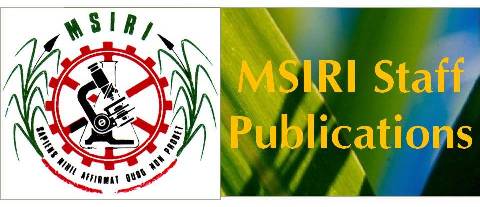Expression profilling of abiotic-stress-inducible genes in sugarcane
| MSI07P4274 | |
| McQualter, R. B. Dookun-Saumtally, A. | |
| Expression profilling of abiotic-stress-inducible genes in sugarcane | |
| periodical | |
| 2007 | |
| Proc. int. Soc. Sug. Cane Technol. | |
| 26: 878-888 | |
| En | |
| En Sp Fr | |
| Drought is an important environmental factor which affects sugar cane productivity world-wide. Production of drought resistant sugar cane via conventional breeding is difficult and a molecular approach to developing drought tolerance in sugar cane may be advantageous. One approach, which has successfully produced drought resistant transgenic plants in other crop species, is the use of transcription factors that regulate the drought response. A set of genes containing C-repeat/dehydration response elements in their promoter are activated when plants are exposed to abiotic stress caused by cold, drought or salt. It has been demonstrated in Arabidopsis that the C-repeat binding factor 4 (CBF4) protein plays a role in regulation of some of these genes during drought adaptation. As a prelude to expressing the CBF4 gene in transgenic sugar cane, we chose to profile the expression of sugarcane orthologues of published, abiotic-stress-inducible genes in wild-type sugarcane in response to abiotic stress. Treatments included exposure of wild-type Q117 sugar cane plants to cold, salt and drought stress. Changes in the expression levels of 4 genes encoding galactional synthase (GolS), early response to dehydration protein 4 (ERD4), late embryogenesis abundant protein 3 (LEA3) and pyrroline-5-carboxylase synthetase (P5CS) were evaluated by real-time PCR analysis. The results showed that GolS and P5CS were induced most strongly during salt stress, ERD4 during drought stress and LEA3 during cold stress. A limited number of transgenic lines of Q117 were produced containing the CBF4 gene under the control of the maize Ubi promoter. Over-expression of CBF4 lead to significantly increased expression of ERD4 and P5CS (known targets for CBF activation) when compared to wild-type Q117 plants under normal conditions. Expression levels of GolS and LEA3 were not significantly effected by over-expression of CBF4. Together these results suggest that abiotic-stress-inducible pathways are active in sugar cane and that expression of the Arabidopsis CBF4 gene in transgenic sugar cane can activate these pathways under normal conditions in transgenic sugar cane plants. | |
| sugarcane molecular biology genetics C-repeat binding factor - CBF drought tolerance C-repeat-dehydration response elements transgenic sugarcane | |
| Mauritius | |
| Sugarcane: Genetic techniques and protocols | |
| 2007-08-17 | |
| En | |
| LIB | |
| CAT | |
| BIOTECH |
